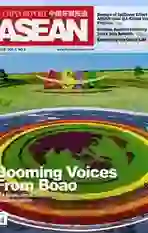Seeing the World from a New Perspective
2018-05-14WangFang
Wang Fang
Peking Universitys Institute of Area Studies provides fresh perspectives for scholars
and students to understand global issues
“As China evolves from a regional to a global power, it needs more knowledge and a better understanding of the rest of the world,” declared Lin Jianhua, president of Peking University, in an address at the inauguration ceremony of the Institute of Area Studies & Academic Seminar at Peking University on April 12. “This raises the requirements for the academic community. Universities and research institutions alike should provide academic and personnel support for the development of the country and the world as well.”
Alongside increasing international exchange in a changing world, enhancing mutual understanding has become a pressing task for many nations. Many Chinese universities have already established think tanks and academies committed to regional and national studies.
Strategic Consulting
“Peking University has designated area studies as one of its three key interdisciplinary fields, aiming to build it into a platform for integrating academic resources, restructuring existing disciplines and providing strategic consulting for the state,” President Lin continued.
One of the most prestigious and influential universities in China, Peking University enjoys exceptional advantages but also faces challenges. In the eyes of President Lin, although the university maintains dominance in the basic subjects of area studies such as foreign languages and history of foreign countries, it remains challenged by isolated language teaching from other specialties, a gap between historical research and actual reality and other issues.
Wang Jisi, dean of the School of International Studies and director of the Center for International and Strategic Studies at Peking University, believes that area studies should involve multiple disciplines, and that study of different countries should focus not only on characteristics of various countries but also common ground. According to Wang, the most daunting predicament in the field the university now faces is not a lack of materials, but a lack of theory.
Because it involves interdisciplinary studies, Shen Zhihua, a lifetime professor of history at East China Normal University, considers historical research fundamental to area studies. He explained that to gain a better understanding of the world, scholars with state-class think tanks should focus on fundamental studies and work to offer new perceptions and academic support for national decision makers. Shen also stressed that knowledge from neighboring countries can be documented in archives. And with a plethora of archive materials accumulated over the years, he hopes to contribute to area studies.
“Area studies is an academic tool for seeing and studying the world,” opined Professor Qian Chengdan, dean of the Institute of Area Studies at Peking University. “It not only meets the trend of the times, but reflects our consciousness.” Based on fundamental and forward-looking academic research, the institute aims to develop a distinctive model for area studies to contribute to Chinas area studies and international academic exchange.
After beginning operations, the school will focus on academic research, personnel training, think tank functions and domestic and international academic exchanges.
Bridge Between China and ASEAN
“The relationship between China and Southeast Asian countries has changed since the 18th National Congress of the Communist Party of China in 2012, raising the demand for interdisciplinary studies on Southeast Asia, but an interdisciplinary system has yet to be established,” said Zhai Kun, a professor at the School of International Studies of Peking University and deputy president of China Association of Southeast Asian Studies.
From Zhais perspective, the development of Southeast Asia has caused a series of new phenomena that make forging a comprehensive interdisciplinary studies system a necessity. He elaborated on its importance from five angles:
Strategically, while aligning with the Belt and Road Initiative, interdisciplinary studies can help ensure synergy with development strategies of Southeast Asian countries.
From a policy angle, after the reform of Party and State institutions was adopted at the annual NPC and CPPCC sessions this March, policies need to be readjusted to better comply with current policies on Southeast Asia. Experts and scholars should closely follow the changes of policies in both China and Southeast Asia.
In terms of management, given the fact that any policy eventually ends up as a program, research professionals specializing in economics, finance and risk management are in high demand to implement the policies.
In practical operation, contrasting a decade ago when the Chinese government actively created platforms for State-owned enterprises to expand into Southeast Asia, private companies are now leading transnational operations. This trend will most likely shape new production relations, triggering innovation in policy guidance and academic support. Facing such changes in cooperation between China and Southeast Asia, new academic achievements can only be made through field investigation and in-depth research.
In terms of software, as the public opinion environment for China-ASEAN relations changes, the establishment of supporting, scientific appraisal systems for cooperation technologies, think tank support and achievement evaluation is vital. Liu Xincheng, vice chairperson of the 13th National Committee of the Chinese Peoples Political Consultative Conference (CPPCC) and vice chairman of the Central Committee of China Association for Promoting Democracy, noted that universities are not only advantageous in comprehensive studies and capable of independent, objective analysis and judgment, but they also influence younger generations. He suggested formulation of functions and goals as well as exploration of new types of international cooperation to increase mutual understanding with target countries and regions through consultative cooperation.
This year marks the 5th anniversary of Chinas proposal of the Belt and Road Initiative. As the initiative continues to progress, Chinas economic cooperation and cultural exchange with countries along the route has deepened, making thorough studies on these countries and neighboring countries imperative. The newly established Institute of Area Studies at Peking University is expected to blaze new trails in academic research, talent training, think tank function and domestic and international academic exchanges.
